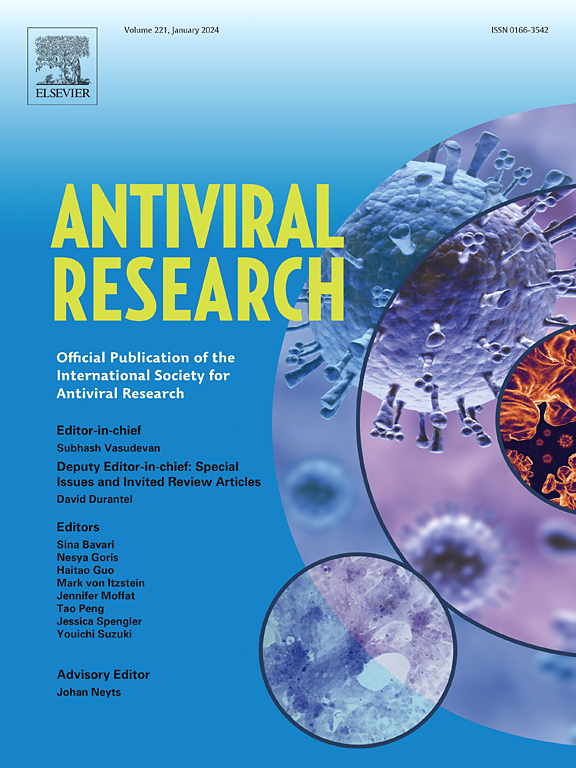新型抗sars - cov -2药物2'-脱氧-2'-螺环西烷-7-去氮杂嘌呤核苷类似物的设计、合成和生物学评价
IF 4.5
2区 医学
Q1 PHARMACOLOGY & PHARMACY
引用次数: 0
摘要
由严重急性呼吸综合征冠状病毒2型(SARS-CoV-2)引起的2019冠状病毒病(COVID-19)大流行造成了前所未有的全球公共卫生危机,并继续对人类健康构成严重威胁。由于病毒的高度突变性质,目前的疫苗和治疗方法对未来新出现的毒株的效力可能有限,因此迫切需要开发新的强效抗病毒药物。在这项研究中,我们设计和合成了一系列新的2'-脱氧-2'-螺环西烷-7-去氮杂嘌呤核苷类似物,作为SARS-CoV-2复制的潜在抑制剂。其中一些化合物显示出强大的抗病毒活性,为治疗干预不断演变的SARS-CoV-2病毒提供了潜在的新武器。在所测试的化合物中,核苷类似物11q在Vero E6细胞中表现出最有效的抗病毒活性,野生型菌株的IC50值为0.14 μM, BA.5菌株的IC50值为0.36 μM。值得注意的是,化合物11q对野生型SARS-CoV-2的抑制活性比Remdesivir高9倍,并且具有优越的选择性指数。这些发现表明,化合物11q是未来用于对抗SARS-CoV-2的药物开发的极有希望的主要候选药物。本文章由计算机程序翻译,如有差异,请以英文原文为准。

Design, synthesis, and biological evaluation of novel 2′-deoxy-2′-spirooxetane-7-deazapurine nucleoside analogs as anti-SARS-CoV-2 agents
The COVID-19 pandemic, caused by severe acute respiratory syndrome coronavirus 2 (SARS-CoV-2), has caused an unprecedented global public health crisis and continues to pose grave threats to human health. The efficacy of current vaccines and therapeutics is likely limited for future emerging strains due to the highly mutative nature of the virus, underscoring an urgent need for the development of new, potent antiviral agents. In this study, we report the design and synthesis of a series of novel 2′-deoxy-2′-spirooxetane-7-deazapurine nucleoside analogs as potential inhibitors of SARS-CoV-2 replication. Some of these compounds demonstrate potent antiviral activity, offering a potential new weapon for therapeutic intervention against the ever-evolving SARS-CoV-2 virus. Among the tested compounds, nucleoside analog 11q exhibited the most potent antiviral activity against SARS-CoV-2 in Vero E6 cells, with IC50 values of 0.14 μM for the wild-type strain and 0.36 μM for the BA.5 strain. Notably, compound 11q exhibits up to nine times greater inhibitory activity against wild-type SARS-CoV-2 compared to Remdesivir and also possesses a superior selectivity index. These findings suggest that compound 11q is a highly promising lead candidate for future drug development aimed at combating SARS-CoV-2.
求助全文
通过发布文献求助,成功后即可免费获取论文全文。
去求助
来源期刊

Antiviral research
医学-病毒学
CiteScore
17.10
自引率
3.90%
发文量
157
审稿时长
34 days
期刊介绍:
Antiviral Research is a journal that focuses on various aspects of controlling viral infections in both humans and animals. It is a platform for publishing research reports, short communications, review articles, and commentaries. The journal covers a wide range of topics including antiviral drugs, antibodies, and host-response modifiers. These topics encompass their synthesis, in vitro and in vivo testing, as well as mechanisms of action. Additionally, the journal also publishes studies on the development of new or improved vaccines against viral infections in humans. It delves into assessing the safety of drugs and vaccines, tracking the evolution of drug or vaccine-resistant viruses, and developing effective countermeasures. Another area of interest includes the identification and validation of new drug targets. The journal further explores laboratory animal models of viral diseases, investigates the pathogenesis of viral diseases, and examines the mechanisms by which viruses avoid host immune responses.
 求助内容:
求助内容: 应助结果提醒方式:
应助结果提醒方式:


